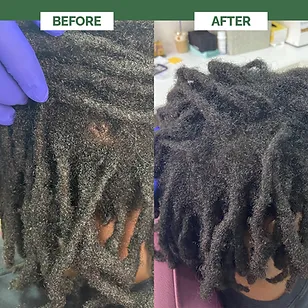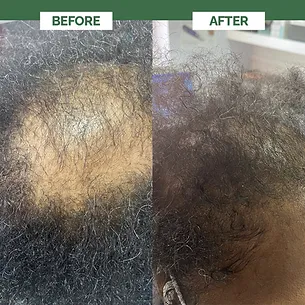Hair Loss in PCOS: What You Need to Know
- Paula Bland
- Aug 4, 2022
- 7 min read
Updated: Oct 12, 2023
It is no secret that PCOS comes with its own set of challenges for those who have fallen victim to its unwanted presence. It not only plays havoc with your insides but also knows how to make its presence felt conspicuously on your body outside. Mind you; we are not merely talking about the pimples or the weight gain but something more prominent. It's your hair. Yes, that beacon at the top of your head attracts trouble like a magnet when it comes to health hazards. The first sign of trouble comes looming in your hairbrush or the shower. Then suddenly, the alarm goes off when you notice your hair has become too limp, a tight ponytail reveals much more scalp than usual, or the hair begins to feel too thin. Yes, welcome to the world of hair loss from PCOS.
How does PCOS cause hair loss?

Ovarian follicles typically rupture each month to produce an egg. However, in women with PCOS, these follicles continue to grow, develop into cysts, and produce excessive androgens (also known as male hormones, though everyone has them) into the body. Various symptoms, including irregular periods, obesity, and type 2 diabetes, may be brought on by this condition. One reason that is thought to cause hair loss is increased androgen hormone levels. A higher level of testosterone may circulate throughout the body due to hyperandrogenism. This testosterone may bind to receptors in our hair follicles to miniaturize or cause hair thinning.
While hyperandrogenism can contribute to hair thinning and hair loss, many women who have hair loss from PCOS do not exhibit indications of androgen excess. Several studies have indicated that female pattern hair loss patients have androgen levels that are primarily within the
normal range, which supports the theory that the ratio of androgen to estrogen, rather than the androgens themselves, is to blame for hair loss in these patients.
Symptoms of Hair Loss in PCOS
PCOS hair loss can be one of the most distressing symptoms of the condition, both physically and emotionally. PCOS, or polycystic ovary syndrome, is a hormonal disorder that affects women of reproductive age. According to research, one of the significant and most common causes of hair loss in women worldwide is PCOS. Thus, educating ourselves about the consequences of hair loss with PCOS, which affect so many women worldwide, is critical.
PCOS can cause hirsutism, or excess hair, on the face or other areas of the body where thick hair doesn't usually grow
Hair loss and thinning on the scalp can also occur in people with PCOS
Some people may experience both hirsutism and hair loss simultaneously
Since PCOS Hair loss is one of the more visible symptoms, it becomes necessary to develop a better understanding of the condition to reverse the process.
.
Female Pattern Hair Loss
The three stages of female pattern hair loss are commonly described as
Small spots of hair loss, with fragile and thin hair mixed in with the healthy ones.
Bald patches and numerous fine hairs.
Hair is fuzzy and almost unnoticeable.
While female pattern hair loss isn't the same as male pattern baldness, it makes your scalp more visible, your hair thinner, and can cause your part to widen. This type of hair loss is also known as "female androgenic alopecia " because of the role of androgen hormones in causing hair loss.
With PCOS, hair loss can happen at the root, from where the hair shaft and follicle grow out, or it can occur as breakage because the hair is drier and more vulnerable to harm from heat and brushing. Hair can be more frizzy due to breakage, and the scalp more noticeable, especially around the crown and hairline, due to hair loss. Hair thinning is more significant in the middle and primarily falls out in the frontal-parietal region as a symptom of PCOS.
Female pattern hair loss, hair loss PCOS, and androgenetic alopecia are all linked. Androgens (sometimes referred to as "male" hormones, such as DHT and dihydrotestosterone) play an essential role for both the sexes in terms of puberty, libido and hair development. In women with androgenetic alopecia, these hormone levels can become excessive, resulting in hair loss.
What is the treatment for hair loss in PCOS?
Hair loss brought on by PCOS needs to be addressed holistically, both externally with the aid of proper hair care and inside by taking care of the body with nutrition and exercise as well as consulting with a doctor about possible medical treatments. It's likely that your hair won't regrow on its own if PCOS causes you to lose it. To treat PCOS hair loss and to encourage new hair growth, you'll need to employ various treatments for PCOS hair loss.
Minoxidil
Minoxidil is the first line of treatment suggested for hair regrowth before venturing into any hair loss PCOS treatments. Minoxidil (Rogaine) 5% is an FDA-approved topical treatment that must be applied to the scalp daily.
Oral contraceptives
Oral contraceptives or birth control pills lower androgen hormone levels. They control irregular menstrual cycles and other PCOS symptoms, including acne. Some medical professionals treat hair loss with birth control pills and other anti-androgenic drugs like Spironolactone (Aldactone), Flutamide, etc.
Platelet-rich plasma (PRP)
In a three-step medical procedure called PRP (platelet-rich plasma therapy for hair loss), a patient's blood is extracted, processed and injected into the scalp. PRP injections are thought to stimulate and maintain natural hair growth by boosting blood flow to the hair follicle and thickening the hair shaft. This method is occasionally used in conjunction with other PCOS hair loss treatments or drugs. Doctors usually employ this treatment when androgenetic alopecia, a common condition that causes hair follicles to shrink, is the root of hair loss. In men, this is referred to as male pattern baldness.
Understanding how PRP works requires an understanding of how platelets contribute to healing. Red and white blood cells, as well as platelets, make up blood. When a person suffers a cut or wound, platelets are among the body's "first responders," arriving to stop the bleeding and promote healing. PRP contains a variety of proteins and growth factors that aid in tissue regeneration. Because damage to hair follicles can cause hair loss, researchers hypothesized that PRP could promote hair growth by reversing the process that occurs in androgenetic alopecia.
PRP is not a cure for conditions that cause hair loss. A person would therefore require multiple PRP treatments over time to maintain hair growth. The doctor will recommend a different frequency for PRP treatments based on a person's condition and initial treatment results.
There are a few surgical procedures available for hair regrowth. To promote hair growth, doctors recommend red, near-infrared, or low-level light therapy. In severe cases, to treat PCOS hair loss, surgery such as hair transplant, in which hair follicles are extracted from an area with a lot of hair and then transferred to an area where you have hair loss, is also recommended. It is expensive, and there is no guarantee that it will work.
Nutrients
The impact of various nutrients on hair loss has been debated, but it is widely accepted that diet influences hair health, loss, and growth. However, more research is needed, particularly concerning PCOS-related hair loss in women. Here is a list of nutrients that play an essential role in hair growth.
Omega 3
Studies on the effects of omega 3 on PCOS symptoms have revealed that it lowers androgen levels in PCOS patients. Omega-3, 6, and 9 fatty acids, when combined with a broader nutritional strategy, help to increase hair volume and strength and reduce greasiness. They help to minimize PCOS hair loss.
Myo-inositol
As one of the treatments for PCOS hair loss, Inositols, a subclass of B-group vitamins found in plants, animals, and people, are widely known to help with PCOS symptoms.
Myo-inositol, a particular type of inositol, has been shown to help PCOS patients by reducing testosterone levels, controlling the menstrual cycle, and reducing physical symptoms, including hirsutism (extra body hair in places where it usually doesn't grow) and acne. It is probably helpful in avoiding hyperandrogenism and PCOS hair loss, given that it has been shown to reduce testosterone levels in PCOS-affected women.
Iron
People with PCOS frequently have low ferritin levels, a blood cell protein that transports iron, and iron deficiency is one of the leading causes of hair loss. Iron levels can be raised by eating iron-rich food or taking iron supplements.
Vitamin D
There has been limited research on vitamin D's involvement in the hair cycle. It is known that a lack of vitamin D receptors, which are locations where other cells can respond to vitamin D, has been shown to disrupt the hair follicle cycle, particularly the growth (anagen) phase. This suggests that vitamin D, at least in part, plays a role in hair development.
PCOS hair loss is a serious matter, but it is nothing that cannot be managed or reversed. Thus, treating all of your hair-related issues begins with adopting the proper attitude and receiving the appropriate advice from a professional. The goal is to become informed and familiar with both internal and exterior treatment modalities. The founder of TLP and Hair aesthetician Paula Bland is known for her holistic approach toward all hair loss and scalp issues. Her hair consultation has helped many women deal with severe PCOS hair loss issues holistically without the use of prescription medications. Visit our website now to book an appointment to treat hair loss issues from PCOS holistically.
These pictures illustrate some of our customers' successful PCOS hair loss journey through the holistic treatment administered by Paula.
More from Paula Bland:
About The Author: Paula Bland

The founder of TLP, Paula Bland, is a medically qualified Nurse Practitioner, Hair aesthetician and also a psychiatric Nurse Practitioner known for her highly effective hair consultation. Paula has a non-traditional approach to hair care and advocates a chemical-free, natural, and holistic approach. The Love of People is her brainchild, and its products reflect her approach to hair health and have helped women with naturally curly hair manage their curls in a chemical-free and organic way.


Comentarios